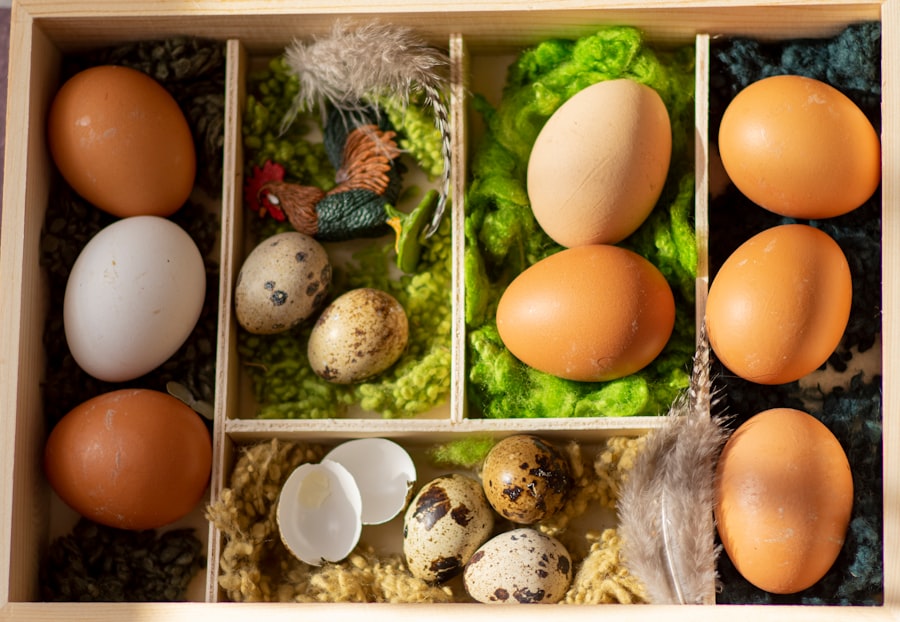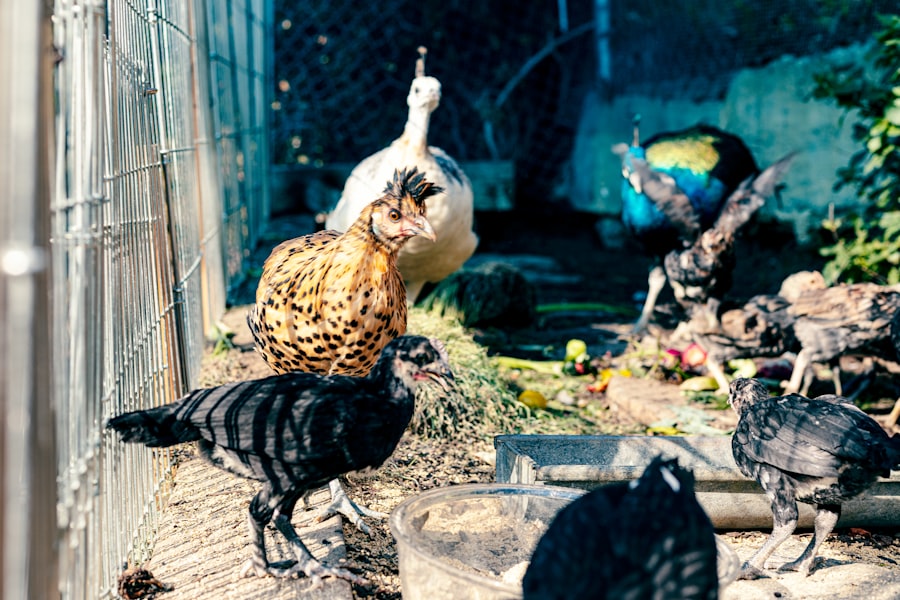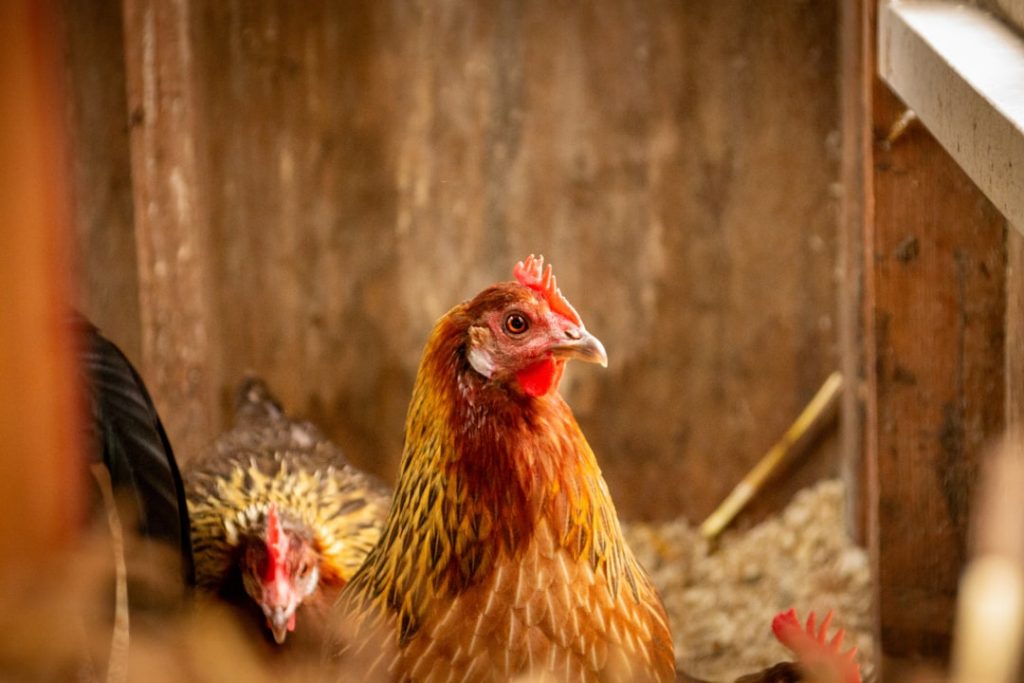When selecting chicken breeds for a backyard flock, several factors should be considered. Climate is a primary concern, as some breeds are better adapted to cold weather, while others thrive in warmer conditions. The intended purpose of the flock is also crucial, whether it’s for egg production, meat, or companionship.
Breeds like Leghorns and Rhode Island Reds are known for high egg production, while Cornish Cross and Freedom Rangers are suitable for meat production. Temperament is another important factor, as breeds vary in their docility and friendliness. The available space should also be taken into account, with smaller breeds like Silkies and Sebrights being more suitable for urban environments with limited space.
Larger breeds such as Orpingtons and Sussex are better suited for properties with ample room for foraging. For those living in close proximity to neighbors, considering the noise level of different breeds is advisable, as some chickens are more vocal than others. The choice of breed significantly impacts the overall success and enjoyment of keeping backyard chickens, making it a decision that requires careful consideration of these various factors.
Table of Contents
- 1 Creating a Coop and Run
- 2 Feeding and Nutrition
- 3 Health and Wellness
- 4 Egg Production and Care
- 5 Managing Behavior and Socialization
- 6 Legal Requirements and Regulations
- 7 FAQs
- 7.1 What is a “How to Keep Chickens” class in St. Louis?
- 7.2 Who can benefit from taking a “How to Keep Chickens” class?
- 7.3 What are the benefits of raising chickens in an urban or suburban setting?
- 7.4 Where can I find a “How to Keep Chickens” class in St. Louis?
- 7.5 What should I expect to learn in a “How to Keep Chickens” class?
- 7.6 Are there any legal considerations for keeping chickens in St. Louis?
Key Takeaways
- Consider the climate, space, and purpose of raising chickens when choosing the right breed for your flock.
- When creating a coop and run, prioritize safety, space, and protection from predators.
- Provide a balanced diet with access to fresh water and appropriate supplements for optimal chicken health and nutrition.
- Regularly monitor and maintain the health and wellness of your chickens through vaccinations, parasite control, and proper hygiene.
- Maximize egg production and care for your chickens by ensuring a clean nesting area and proper lighting and temperature conditions.
Creating a Coop and Run
Designing the Coop
When designing your coop, it’s essential to consider factors such as ventilation, insulation, and predator protection. Proper ventilation is crucial for maintaining good air quality and preventing moisture buildup, which can lead to respiratory issues in chickens. Insulation is also important, especially in colder climates, to help regulate the temperature inside the coop. Additionally, you’ll want to make sure that your coop is secure from predators such as raccoons, foxes, and birds of prey.
Securing the Coop
To secure your coop, you may need to use hardware cloth instead of chicken wire, install locks on doors and windows, and bury wire mesh around the perimeter of the coop to prevent digging. These measures will help protect your chickens from predators and ensure their safety.
Designing the Run
When it comes to the run, it’s important to provide enough space for your chickens to exercise and exhibit natural behaviors like scratching and dust bathing. The general rule of thumb is to provide at least 10 square feet of outdoor space per chicken. You’ll also want to provide some form of shelter within the run, such as a covered area or a shady spot, to protect your chickens from the elements.
Run Flooring and Maintenance
Additionally, it’s important to consider the flooring of the run. Grass or dirt is ideal for allowing chickens to forage and dust bathe, but if this isn’t possible, you can use materials like wood chips or sand. Overall, creating a suitable coop and run for your backyard flock is essential for their health and well-being.
Feeding and Nutrition

Proper feeding and nutrition are essential for maintaining the health and productivity of your backyard flock. When it comes to feeding chickens, it’s important to provide a balanced diet that meets their nutritional needs. This typically includes a combination of commercial feed, kitchen scraps, and access to fresh water at all times.
Commercial feed comes in different formulations depending on the age and purpose of your chickens. For example, there are starter feeds for chicks, grower feeds for young chickens, layer feeds for hens producing eggs, and broiler feeds for meat-producing chickens. It’s important to choose a high-quality feed that is appropriate for the age and purpose of your flock.
In addition to commercial feed, kitchen scraps can be a valuable supplement to your chickens’ diet. However, it’s important to be mindful of what you’re feeding them. Avoid giving them foods that are high in salt, sugar, or fat, as well as anything that is spoiled or moldy.
Some healthy kitchen scraps that chickens enjoy include fruits and vegetables, grains, and protein sources like cooked eggs or mealworms. It’s also important to provide access to grit and oyster shell, which help chickens digest their food and maintain strong eggshells, respectively. Overall, providing a balanced diet that includes commercial feed, kitchen scraps, grit, and oyster shell is essential for keeping your backyard flock healthy and productive.
Health and Wellness
Maintaining the health and wellness of your backyard flock is a top priority for any chicken keeper. There are several key aspects to consider when it comes to keeping your chickens healthy. First and foremost, it’s important to practice good biosecurity measures to prevent the spread of diseases within your flock.
This includes quarantining new birds before introducing them to your existing flock, as well as regularly cleaning and disinfecting the coop and run. Additionally, it’s important to monitor your chickens for signs of illness or injury on a regular basis. Common signs of illness in chickens include lethargy, decreased appetite, abnormal droppings, respiratory issues, and changes in behavior.
Another important aspect of maintaining the health of your flock is providing regular veterinary care. This may include vaccinations against common diseases like Marek’s disease or Newcastle disease, as well as routine check-ups to monitor overall health and well-being. It’s also important to be proactive about parasite control, including regular deworming and treating for external parasites like mites and lice.
Finally, providing a clean and comfortable living environment is essential for keeping your chickens healthy and happy. This includes regular cleaning of the coop and run, providing fresh bedding material, and ensuring proper ventilation and insulation. Overall, maintaining the health and wellness of your backyard flock requires diligence and attention to detail.
Egg Production and Care
For many backyard chicken keepers, one of the primary motivations for keeping chickens is the production of fresh eggs. There are several key factors that can impact egg production in your flock. First and foremost, it’s important to provide a balanced diet that meets the nutritional needs of laying hens.
This includes providing access to high-quality layer feed as well as supplemental calcium in the form of oyster shell. Additionally, ensuring that your hens have access to fresh water at all times is crucial for maintaining good egg production. Another important factor that can impact egg production is lighting.
Chickens require a certain amount of daylight in order to lay eggs consistently. In general, hens need around 14-16 hours of daylight per day in order to maintain peak egg production. If natural daylight is insufficient, you can supplement with artificial lighting in the coop to ensure that your hens receive enough light.
It’s also important to provide suitable nesting boxes where your hens can lay their eggs in a clean and comfortable environment. Once your hens start laying eggs, it’s important to collect them on a regular basis to prevent them from becoming dirty or damaged. It’s also important to store eggs properly in a cool environment in order to maintain their freshness.
Finally, it’s important to monitor your hens for signs of reproductive issues or egg-related health problems such as egg binding or prolapse. Overall, ensuring good egg production and care in your backyard flock requires attention to detail and proper management practices.

Providing Adequate Space
Chickens are social animals that thrive in a group environment, so managing their behavior and socialization is an important aspect of keeping a backyard flock. One key consideration when it comes to managing behavior is providing enough space for your chickens to roam and exhibit natural behaviors like scratching and dust bathing. Overcrowding can lead to stress and aggression within the flock, so it’s important to provide enough space both inside the coop and in the outdoor run.
Environmental Enrichment
Another important aspect of managing behavior is providing suitable enrichment activities for your chickens. This can include things like perches or roosts inside the coop, as well as objects for pecking and scratching in the run. Providing environmental enrichment can help reduce boredom and prevent negative behaviors like feather pecking or aggression within the flock.
Socialization is also an important aspect of managing behavior in a backyard flock. If you’re introducing new birds into an existing flock, it’s important to do so gradually in order to minimize stress and aggression. Additionally, spending time with your chickens on a regular basis can help build trust and reduce fearfulness within the flock.
Maintaining a Harmonious Flock
Overall, managing behavior and socialization in a backyard flock requires providing enough space, enrichment activities, and positive social interactions in order to maintain a harmonious group dynamic.
Legal Requirements and Regulations
Before starting a backyard flock, it’s important to be aware of any legal requirements or regulations that may apply in your area. This can include zoning laws that dictate whether or not you’re allowed to keep chickens on your property, as well as any restrictions on the number of chickens you’re allowed to keep. Additionally, some areas may have specific regulations regarding coop construction or placement in order to ensure the health and safety of both the chickens and surrounding community.
It’s also important to be aware of any local ordinances regarding noise levels or odor control associated with keeping chickens. Finally, it’s important to be aware of any potential health regulations that may apply to keeping backyard chickens in order to prevent the spread of diseases within the community. Overall, being aware of legal requirements and regulations is an important aspect of responsible chicken keeping in a backyard setting.
If you’re interested in learning more about how to keep chickens in St. Louis, you may also want to check out this article on the importance of the floor of a chicken coop here. It provides valuable information on the different types of flooring materials and their benefits for maintaining a clean and healthy coop environment for your chickens.
FAQs
What is a “How to Keep Chickens” class in St. Louis?
A “How to Keep Chickens” class in St. Louis is a workshop or course that teaches participants the basics of raising and caring for chickens in an urban or suburban setting. The class typically covers topics such as chicken breeds, coop construction, feeding and nutrition, health care, and local regulations.
Who can benefit from taking a “How to Keep Chickens” class?
Anyone interested in raising chickens, whether for eggs, meat, or as pets, can benefit from taking a “How to Keep Chickens” class. This includes beginners who have never raised chickens before, as well as experienced chicken keepers looking to expand their knowledge.
What are the benefits of raising chickens in an urban or suburban setting?
Raising chickens in an urban or suburban setting can provide a sustainable source of fresh eggs, natural pest control for gardens, and a connection to where food comes from. Additionally, chickens can be enjoyable and educational pets for families and individuals.
Where can I find a “How to Keep Chickens” class in St. Louis?
“How to Keep Chickens” classes in St. Louis may be offered by local community centers, adult education programs, agricultural extension offices, or urban farming organizations. Online resources and social media groups may also provide information on upcoming classes and workshops.
What should I expect to learn in a “How to Keep Chickens” class?
In a “How to Keep Chickens” class, participants can expect to learn about selecting and caring for chicken breeds, building or purchasing a suitable coop, providing proper nutrition and healthcare, and understanding local regulations and ordinances related to keeping chickens.
Are there any legal considerations for keeping chickens in St. Louis?
Yes, there are legal considerations for keeping chickens in St. Louis. Local ordinances may regulate the number of chickens allowed, coop requirements, and distance from neighboring properties. It’s important to be aware of and comply with these regulations when keeping chickens in an urban or suburban setting.
Meet Walter, the feathered-friend fanatic of Florida! Nestled in the sunshine state, Walter struts through life with his feathered companions, clucking his way to happiness. With a coop that’s fancier than a five-star hotel, he’s the Don Juan of the chicken world. When he’s not teaching his hens to do the cha-cha, you’ll find him in a heated debate with his prized rooster, Sir Clucks-a-Lot. Walter’s poultry passion is no yolk; he’s the sunny-side-up guy you never knew you needed in your flock of friends!







